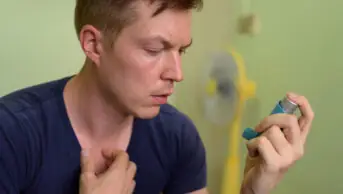
Courtesy of Mosan Ashraf
Homecare services are provided to more than 310,000 patients across the UK at a current spend of £2.6bn per year, but homecare service providers are contracted to provide the service on our behalf. They dispense and deliver medicines and sometimes offer additional nurse support and training. As homecare medicines lead at University Hospitals of Derby and Burton (UHDB) NHS Foundation Trust, I am responsible for ensuring that patients across the UK receive their specialist medicines in a safe and secure manner.
8:00 — start
My day starts at 8:00, traffic permitting. I review any emails that have come through overnight — these could be anything from an automated report notifying us that a new prescription is due, to a report from a provider about a patient having an adverse event. My job is to either make a decision and reply to these emails or escalate to the relevant clinical team (of which there are 13), for a response.
I get the first set of prescriptions processed for the Medical Day Case Unit ready for the homecare team briefing at 9:30. In this meeting, we discuss outstanding queries that could be clinical in nature or simply administrative. This can be challenging, not only because of the complexity of working with various clinical teams across different sites, but also because of the sheer volume of emails and phone calls my team receives.
Commissioning knowledge is important for this role as 90% of medicines that my team works with are expensive and non-tariff
I carry out a clinical check of prescriptions. The team then generates a purchase order document, updates our databases, and then determines the urgency and organises delivery of the medicines to the homecare company.
10:00
I have been asked to review and comment on a commissioning pathway for a rheumatology indication written by the local clinical commissioning group (CCG). I update this in line with updated guidance from the National Institure for Health and Care Excellence (NICE) and send this over to colleagues at the CCG for comment. Commissioning knowledge is important for this role as 90% of medicines that my team works with are expensive and non-tariff.
11:00
I have my first meeting with a pharmaceutical company to discuss a new NICE technology appraisal. We discuss the formulary process at UHDB, the particulars of any relevant medicines and discuss homecare arrangements. I then schedule a call with the homecare provider where we discuss the service in detail in terms of how it will work day to day, as well as how to approach any issues that may arise. Communication is integral to success, so I ensure all clinical team details are up to date.
I am sent the service contract for a medicine listed in the NICE technology appraisal, which I review and add comments to. I then send this to the East Midlands Pharmacy Collaborative team, which has specialist contracting knowledge pertaining to the homecare sector. Their input is vital as they tender for the homecare services within the region. This part of the job is unique to homecare where contracting and procurement knowledge is part of the job.
I try my utmost to focus on the positives; however, we do come across incidents where patients may not receive the standard of service that I would expect.
13:30
I have a service review with one of our homecare service providers. We meet each provider on a quarterly basis — sometimes more regularly if we have pressing issues. This is a great opportunity for me to learn about any advancements or service developments and also for me to raise any concerns to ensure UHDB and its patients receive the best possible service. I try my utmost to focus on the positives; however, we do come across incidents where patients may not receive the standard of service that I would expect.
In such instances, I submit a request to investigate the incident to the homecare service provider in accordance with Appendix 19 of the Royal Pharmaceutical Society Standards for Homecare. I then review the learning from the investigation, including the preventative actions and approve the letter that is sent to the patient with the outcome of the investigation.
I also discuss invoicing issues and key performance indicators (KPIs). KPI standards are set by the National Homecare Medicines Committee and paint a picture of the performance of providers and UHDB.
15:00
We pay invoices for our medicines after they are delivered to patients, which shows up as debt on our KPIs. I meet my finance team to discuss an ever-increasing amount of debt that is concerning me. I am informed this is owing to a number of query invoices which are yet to be resolved.
I review some incidents that come through on our incident reporting system and some responses from the homecare company; I use these to update the patient safety Datix software system. An error has occurred owing to an internal process failure. I need to ensure our internal processes are adjusted to ensure the error is not repeated, so I ask one of my team members to make the alterations ready for me to review the next day. I will then submit this to UHDB pharmacy governance quality and risk group,
I have an update with my team for any urgent matters that need my attention. There is a patient who has called in to say she has one day’s supply of medicine left, and she is understandably anxious. I call the service provider and ensure a delivery is made in time for the patient’s next dose. I also report this in my incident log ready so I can observe any trends that appear and raise them in my next meeting with the service provider.
16:00 — finish
I ensure all prescriptions for the day have been validated and posted, and sit down to review more emails. I organise my diary for the coming day and start completing some homecare reports as mandated by our commissioners.
As the day draws to an end, I catch the bus and start mentally preparing for an upcoming medicines optimisation project for best-value medicines I will be leading over the coming months.
Advice to pharmacists interested in a similar role
- Gain a deeper understanding of commissioning structures, types of medicines payment categories and procurement rules in the NHS;
- Read around the subject, starting with the Hackett Report,the Royal Pharmaceutical Society also has several useful resources in this area;
- Have a keen attention to detail, as governance is key in homecare;
- Get involved in commissioning work, medicines optimisation and complaints handling as these are all linked with homecare;
- Enjoy working within a range of different clinical areas that use highly specialised medicines;
- Expect a salary in NHS Agenda for Change band 7–8A.


